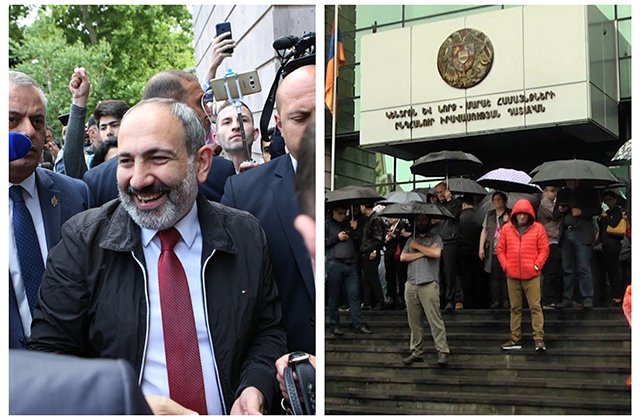Venice Commission gives a slap

About two months ago, 168.am released information stating that the incumbent authorities of Armenia had received a letter from the Venice Commission (VC) that contained rather coarse evaluations. According to our source, the Commission had condemned the blockade of courts following Pashinyan’s call and the direct involvement of MPs of the ruling political party in the blockade.
168.am had also literally written that the Venice Commission had conditioned the actions of the Prime Minister and his team with the release of Robert Kocharyan, but under the veil of a fight against corruption. 168.am had also informed our readers that the Commission was preparing to issue a statement and send relevant notes to several international organizations. As already mentioned, 168.am had written about this on May 27.
The Government of the Republic of Armenia had, in essence, concealed the mentioned letter, and since 168.am’s press release caused great uproar (in response to the “refutations” of the representatives of government and the attacks of fakes with the use of swearing words, we had demanded publication of the original of the letter), the government decided to publish the unofficial translation of another letter of President of the Venice Commission Gianni Buquicchio and then the original which stated the following: “…the reforms in the judicial system should be developed and carried out through legal measures, in accordance with the Constitution and taking into account the rule of law and the European criteria over human rights”. The representatives of Pashinyan’s cabinet started commenting on this letter unanimously and in their own ways, throwing dirt at 168.am and other mass media outlets, stating that we and other mass media outlets are disseminating false information. As they say, they “plastered” the topic.
Yesterday, Legal Way NGO released the letter that the authorities had carefully concealed from the public and about which 168.am had reported back in May. In essence, the content of the two letters of the Venice Commission might not have been accessible for the public at large, if it wasn’t for our release.
The record of the VC, made public yesterday, particularly stated that, after discussions with a European delegation, the Armenian authorities acknowledged the fact that the general vetting of sitting judges would be neither necessary nor useful, the VC considers the provision envisaging further serving of the chairman and members of the Constitutional Court (Article 213 of the revised Constitution) “clear” and “unambiguous” and said it was disturbing that the statements by Vahe Grigoryan had been applauded in parliament and there might be a risk of interference with the mandates of the sitting judges.
What was also touched upon was the fact that “Prime Minister strictly criticized courts following the court decision on releasing former President of Armenia Robert Kocharyan in exchange of a pledge, asking his supporters to block the entrances to and exits from courts and announced about updating of the judiciary. In his letter addressed to Mr. Prime Minister, the President of the Venice Commission acknowledged that there is lack of confidence in the judiciary, yet insisted that any measure must completely comply with the Constitution and international standards”. 168.am had written about this as well.
What is the most ridiculous is the fact that deputy of the ruling My Step faction of the National Assembly of Armenia, Chair of the Standing Committee on State and Legal Affairs Vladimir Vardanyan had advised journalists to find out how the document could be obtained, while Spokesperson of the Prime Minister Vladimir Karapetyan had said the following: “I consider the release an improper document for commentary. We also need to understand how an advisory document was released in the presses. We will try to clarify this through our representatives to the Venice Commission and draw relevant conclusions.”
Other members of the ruling party were filling the news feed with information stressing the fact that the Venice Commission and its conclusions are not important or declaring that the Commission doesn’t have a good understanding of the realities, or that the Commission doesn’t have a picture of the differences between the terms “member of the Constitutional Court” and “judge of the Constitutional Court”.
Last year, when the wiretapped phone conversations of the Director of the National Security Service of the Republic of Armenia, the Head of the Special Investigation Service and Prime Minister of the Republic of Armenia Nikol Pashinyan were disseminated on the Internet and in the presses, the former Minister of Justice, in response to a journalist’s question whether the government had succeeded in shaping an independent judiciary or not, taking into consideration the observation of the attorneys of second President of Armenia Robert Kocharyan about the content of the wiretapped conversations in which it was clear that Pashinyan’s cabinet is interfering in the judicial system, the minister called on delving deep into the content of the voice recording. Of course, it was never clear why former minister Zeynalyan resigned from office, but it seems as though the incumbent authorities’ working style is the following: don’t have a substantive conversation, but find the source and distract the public’s attention with a lot of meaningless statements at the same time. The former political opposition turned authorities used to cite the conclusions of the Venice Commission for the former authorities and sharply criticize the former authorities, but today, the incumbent authorities are concealing the truth, solving certain domestic political issues by manipulating and making impulsive statements. No matter how much the incumbent authorities disregard the opinion of the VC, those opinions can’t be circumvented or overlooked. It is a fact that Vahe Grigoryan is not the President of the Constitutional Court, the Constitutional Court is not in a crisis, and there will be no general vetting. It is also a fact that international organizations can’t encourage Nikol Pashinyan’s initiative to block the entrances to and exits from courts and can’t consider the judicial reforms legitimate, and it is a fact that the case of the events of March 1, 2008 and the case instituted against Robert Kocharyan are entering into a deadlock in terms of the law.

























